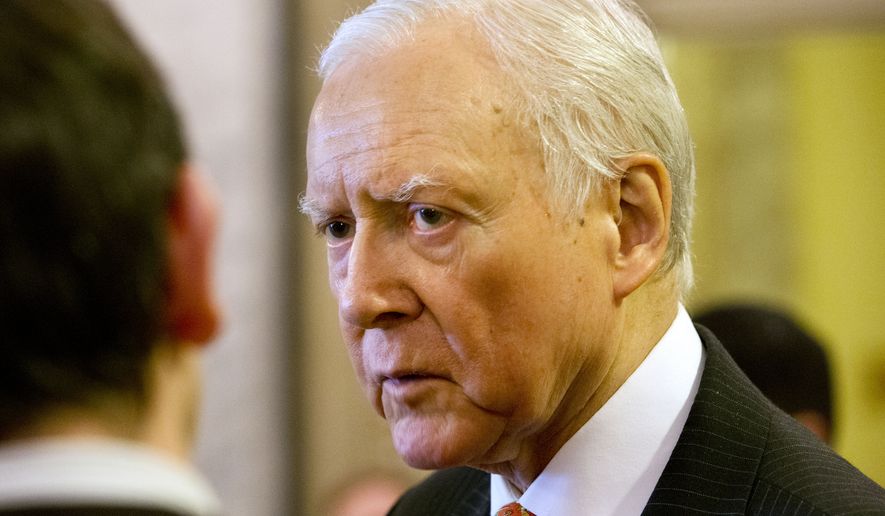President Obama’s top health official refused to say Wednesday if she’s prepared for a Supreme Court ruling that could blow a hole through Obamacare this year, exasperating Republicans who said the White House is putting millions of HealthCare.gov enrollees on a collision course with no exit ramp.
Top Republicans, meanwhile, released a blueprint for their own version of a Plan B — something they said could be fleshed out to replace all of Obamacare should Republicans ever succeed in repealing it.
Health and Human Services Secretary Sylvia Mathews Burwell repeatedly sidestepped the Senate Committee on Finance’s questions about the pivotal court case, which weighs whether the IRS is unlawfully paying out subsidies to millions of customers buying insurance on the federal exchange.
She insisted President Obama is confident he will win the court case, and they haven’t warned Obamacare customers that their subsidies could be in danger.
“We believe we’re in a position that is the right position,” she testified a day after Treasury Secretary Jack Lew also refused to answer questions about backup plans for the court ruling, and even refused to say whether the administration would work with Congress on a fix.
“You’re a highly intelligent, charming person, but you refuse to answer our questions,” Sen. John Cornyn, Texas Republican, told Ms. Burwell on Wednesday.
The Republican proposal, which is not yet a bill, would offer tax credits to people making up to 300 percent of the federal poverty level in place of Obamacare’s 100 percent-to-400 percent window.
People with preexisting medical conditions would never be denied coverage, and they would not be charged more when switching plans so long as they’ve been continuously insured for at least 18 months and do not experience long gaps in coverage.
Those who were uninsured at the time the Republican proposal kicks in could qualify for a onetime enrollment period without facing higher premiums due to medical underwriting.
Also, it would replace the law’s Medicaid expansion with state-by-state grant funding — ostensibly letting people choose between the program and subsidized private coverage — allow people to buy coverage across state lines and, as a revenue source, cap the tax exclusion of employer-based health insurance at $12,000 for an individual and $30,000 for a family.
The new blueprint was written by Senate Committee on Finance Chairman Orrin G. Hatch, Sen. Richard Burr of North Carolina and House Energy and Commerce Committee Chairman Fred Upton.
“Today we offer a bold bicameral plan that fully repeals and replaces the health care law with reforms that empower patients, not Washington,” Mr. Hatch said.
In many ways, it is a spruced-up version of a plan that Mr. Hatch and Mr. Burr offered last year with former Sen. Tom Coburn, although now their party controls Congress and is eyeing 2017, when Obamacare’s namesake will no longer wield a veto.
Democrats quickly dismissed the plan, saying it would fall short of Mr. Obama’s achievement.
“Just like earlier Republican proposals, independent analysts have never estimated similar bills would cover a significant number of the uninsured. This is not a serious proposal,” said Drew Hammill, spokesman for House Minority Leader Nancy Pelosi, California Democrat.
Obamacare’s supporters also have downplayed the lawsuit at the Supreme Court, saying Congress never intended to restrict subsidies to certain states and that the reforms are working.
Obamacare opponents say the plain wording of the law is clear in that it only allows subsidies to be paid to customers using exchanges “established by the state.”
Mr. Hatch said the courts could easily conclude the administration is breaking the law, and he urged Ms. Burwell to have a backup plan.
“I would suggest the administration ought to get one, just in case,” Mr. Hatch told Mrs. Burwell.
Matthew Lawrence, who teaches a seminar on Obamacare at Harvard Law School, said the administration’s silence is unsurprising for several reasons.
Any planning may be in its early stages, and the administration does not want to scare away enrollees before the sign-up deadline, he said. Plus, they don’t want to blow their chances before the Supreme Court.
“If the government is developing a plan that would mitigate some or all of that disruption,” he said, “the very existence of that plan could impact the justices’ thinking about the case.”
While awaiting a court decision, which is expected by the end of June, the administration is continuing to sign up customers for Obamacare.
HHS announced Wednesday that 7.5 million people had signed up on the federal exchange known as HealthCare.gov through Jan. 30, and that at least 2.4 million had picked a plan on the state-run exchanges. The deadline to sign up is Feb. 15.
• Tom Howell Jr. can be reached at thowell@washingtontimes.com.




Please read our comment policy before commenting.